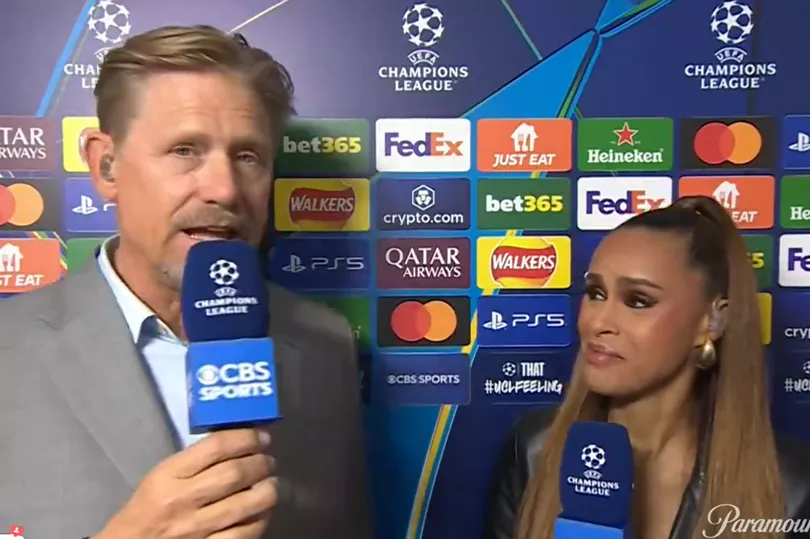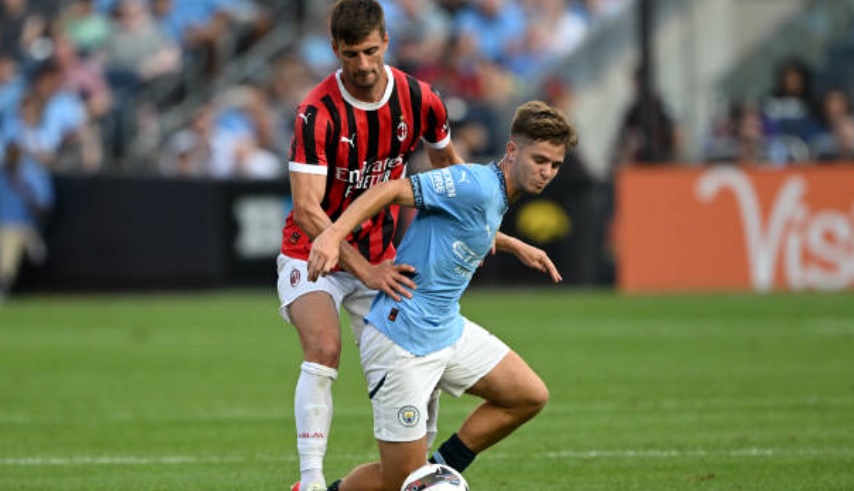Peter Schmeichel took full advantage of his primetime appearance on CBS to take a swipe at Manchester City fans and the atmosphere at the Etihad Stadium during their Champions League clash against Inter Milan. But his criticism was not only ill-informed, it also fed into lazy stereotypes without much thought or context.
It’s one thing to point out that something feels off—perhaps the atmosphere isn’t as lively as expected—but you’d think a bit of research or even asking around would follow. Instead, Schmeichel jumped straight onto live TV in front of a U.S. audience, perpetuating the narrative of City fans lacking passion. When barely challenged by his colleagues, Schmeichel grew defensive, as if it were all just playful banter. But was it really?
Schmeichel was part of the CBS panel covering City’s Champions League opener, and while the game may not have lived up to its hype—he wasn’t wrong in calling it “really, really boring”—everything he said afterward was a misfire. “I like good football and I like excitement from the crowd. It was dead,” Schmeichel declared. “The Etihad today was absolutely dead. The only people we could hear were the Inter supporters.”
He went on to say, “Normally you’d expect a big European night atmosphere, but it just didn’t happen.” And while Schmeichel once donned the City shirt, his loyalties clearly lie with Manchester United. Micah Richards, his fellow panelist and former City defender, tried to defend the club, suggesting that the atmosphere was better over the weekend. Schmeichel’s snide response? “Maybe they left the atmosphere there on Saturday.” The smug grin on Jamie Carragher’s face sealed the deal for CBS as he chimed in on the banter.
Yet City fans were left fuming—and rightly so. Schmeichel’s remarks were not only misplaced but also revealed a lack of basic understanding about why the atmosphere might have felt flat that night.
In reality, the game was tense, and that tension filtered into the crowd’s energy. As Schmeichel himself admitted, the match didn’t exactly inspire a roaring cauldron of noise. But more importantly, if he had bothered to ask any City fan, he would have quickly learned about the ridiculous ticket prices that left many regulars unable to attend.
For this Champions League season, City had hiked their ticket prices, with the Inter Milan match being the most expensive of them all. It was the second of four home games within 11 days, at the very start of a long, grueling season. Fans were looking at an eye-watering cost of nearly £100 for just one adult and child ticket, even before considering travel, parking, and food. Anyone attending all four home games—Brentford, Inter, Arsenal, and Watford—was likely spending over £200 on tickets alone.
Season ticket holders also faced an extra financial burden, with some paying more than £60 on top of their regular costs. And, of course, there’s still a Carabao Cup tie just days away to budget for. In tough economic times, City fans were simply being smart about their money, choosing to prioritize certain matches over others. To shame them for this is not only unfair but also out of touch.
Schmeichel failed to consider the bigger picture. Midweek Champions League games often attract more tourists than hardcore fans, and when regulars stay home, the atmosphere naturally takes a hit. But this phenomenon isn’t exclusive to City. You’ll find quieter crowds in similar circumstances at Old Trafford, or even at Anfield during those “Famous European Nights.”
Instead of jumping to conclusions, Schmeichel could have used his platform to ask more meaningful questions. Why did City increase ticket prices so dramatically for this Champions League campaign? Why has UEFA added yet another fixture to the schedule, further straining fans’ budgets? And why couldn’t UEFA and the EFL come up with a better arrangement to avoid scheduling so many home games in such a short span of time?
Criticizing fans for not creating a raucous atmosphere, when the real issue boils down to affordability, sets a dangerous precedent. Schmeichel’s casual dismissal of these factors, viewed 1.3 million times and counting, does nothing but feed into a tired narrative that fails to grasp the real issues at play.
Sure, the banter won out on the night, but at the expense of City fans who became the easy target of ill-informed jabs.



